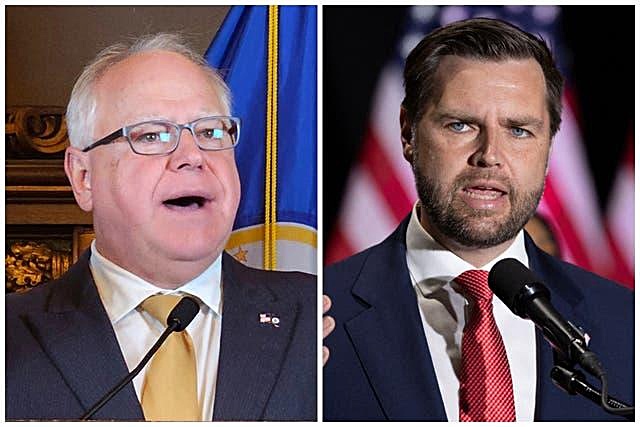The vice presidential candidates for the 2024 election, Senator JD Vance (R-Ohio) and Democrat Minnesota Governor Tim Walz, are set to face each other in a debate on October 1.
CBS News, the host for the debate, announced on August 15 that the Harris-Walz campaign agreed to the proposed date after considering several options. In response, Vance accepted the date but also proposed an additional debate on CNN on September 18.
Typically, there is only one vice presidential debate per election cycle. However, the Harris-Walz campaign communications director Michael Tyler confirmed that Walz will only participate in the CBS debate on October 1.
Now that both campaigns have agreed to the debate, here’s what you need to know:
The CBS News will broadcast the 90-minute debate at 9 p.m. ET with two commercial breaks lasting four minutes each.
The debate will be moderated by Norah O’Donnell, the Network Evening News anchor, and Margaret Brennan, the Face the Nation moderator. It will take place at the CBS Broadcast Center in New York City.
During the debate, there will be no opening statements. The moderators will start by introducing the incumbent party candidate, Tim Walz.
The podium for JD Vance will be on the left side of the television screen, while Tim Walz’s podium will be on the right.
Both candidates will remain behind their respective podiums for the entire duration of the debate.
Similar to the presidential debates, there will be no studio audience present during the vice presidential debate.
Each candidate will have two minutes to answer questions, with an additional minute for rebuttals. The moderators have the discretion to give both candidates an extra minute to delve further into a topic.
CBS will provide lights in front of each candidate to indicate the remaining time for their response. Additionally, a countdown clock will be visible to both candidates.
The coin toss determined the order of the two-minute closing statements. JD Vance won the toss and opted to go last.
CBS may mute the microphones if necessary, but otherwise, they will remain on for the duration of the debate.
Neither candidate will receive the questions in advance, and their campaign staff will not be allowed to interact with them during the breaks.
As with previous debates this year, no props or pre-written notes are permitted on stage. However, both candidates will have a pen, a pad of paper, and a bottle of water.
Prior to the debate, JD Vance has been holding preparation sessions at his home in Cincinnati and online with his team members and Trump campaign strategist Jason Miller.
On the other hand, Tim Walz has sought assistance from Transportation Secretary Pete Buttigieg, who was a 2020 Democrat presidential candidate and has experience in debate preparations, including serving as a stand-in for then-Vice President Mike Pence during Kamala Harris’s preparations in 2020.
Vance, known for appealing to rural and working-class America, focuses on U.S. manufacturing and energy independence. He critiques the Harris-Walz campaign, often labeling them as radical liberals due to Harris’s California background and Walz’s gubernatorial policies.
Expert opinions on the candidates’ debating styles vary. Thomas Hollihan, a professor at USC Annenberg School for Communication and Journalism, expects Vance to be bold and assertive in his presentation. On the other hand, John Murphy, a professor specializing in presidential rhetoric at the University of Illinois, highlights Walz’s relaxed approach and personable speaking style.
Vance has also criticized Walz for mischaracterizing his retirement rank with the Minnesota National Guard. While Vance served in the Marine Corps and was deployed to Iraq, Walz’s military record consists of 24 years in the National Guard, without combat experience.
Aaron Dusso, a political science professor from Indiana University-Indianapolis, advises both candidates to appear competent on all issues but steer the conversation towards their campaign’s strengths. Dusso suggests Walz should emphasize reproductive freedom, social issues, healthcare, education, and “Project 2025.” Vance, on the other hand, should focus on policy matters such as the border, economy, and crime.
Discover more from Tension News
Subscribe to get the latest posts sent to your email.

